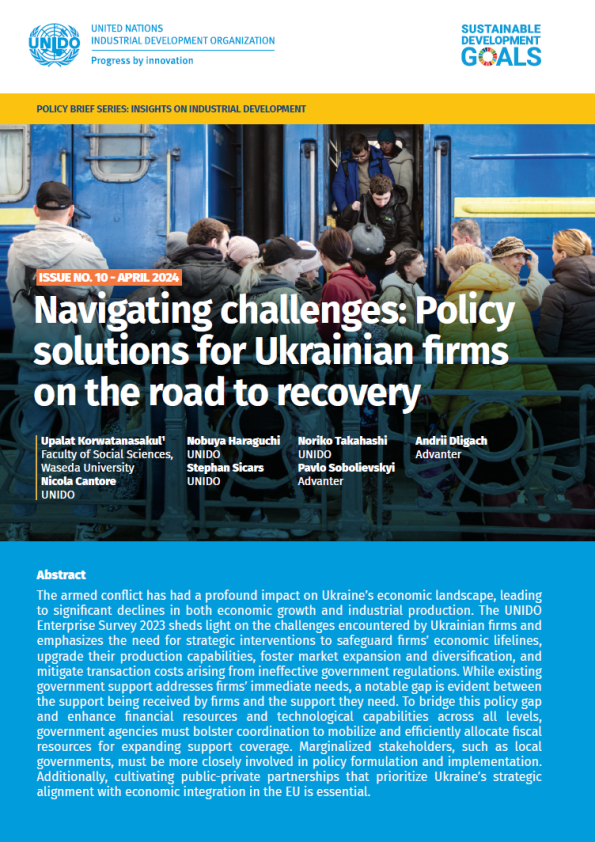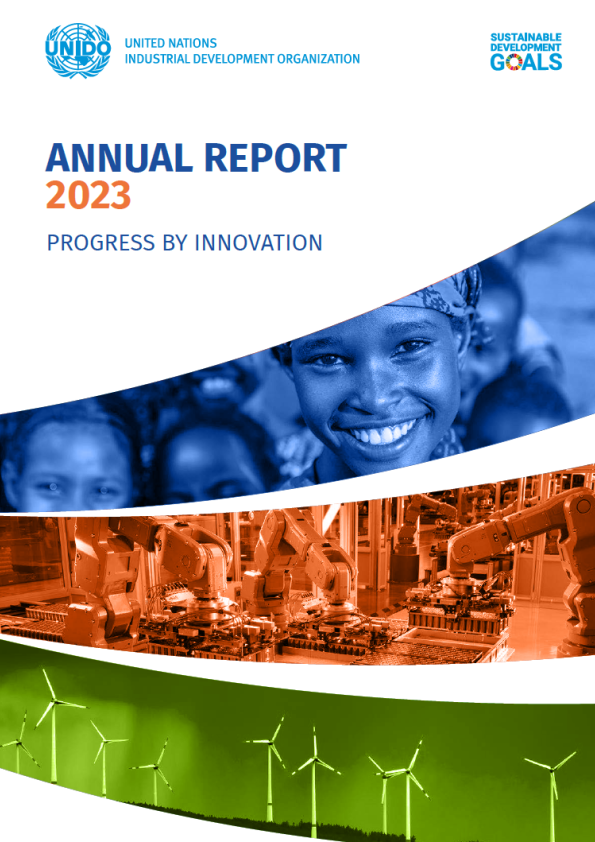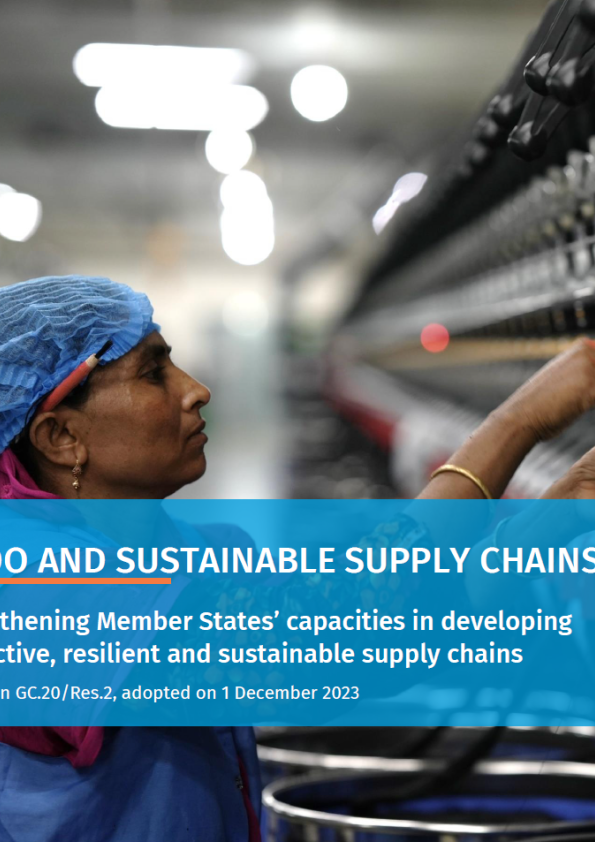
IID Policy Brief 12: Bridging the AI divide: Empowering developing countries through manufacturing
2024 | Author(s): G. Anzolin, N. Haraguchi, A.P. Nishio De Sousa, A. Savrasov, J. Reis
#Policy Brief
UNIDO Publications

IID Policy Brief 12: Bridging the AI divide: Empowering developing countries through manufacturing
2024 | Author(s): G. Anzolin, N. Haraguchi, A.P. Nishio De Sousa, A. Savrasov, J. Reis
#Policy Brief

2024 | Author(s): U. Korwatanasakul, N. Cantore, N. Haraguchi, S. Sicars, N. Takahashi, P. Sobolievskyi, A. Dligach
#Policy Brief
The armed conflict has had a profound impact on Ukraine’s economic landscape, leading to significant declines in both economic growth and industrial production. While existing government support addresses firms’ immediate needs, a notable gap is evident between the support being received by firms and the support they need. To bridge this policy gap and enhance financial resources and technological capabilities across all levels, government agencies must bolster coordination to mobilize and efficiently allocate fiscal resources for expanding support coverage.

2024 | Author(s): N. Haraguchi & M. Sanfilippo
#Policy Brief
The industrialization gap between African and Asian LDCs has increased considerably in the last 20 years, with Asian LDCs’ MVA per capita growing threefold compared to that of African LDCs between 2000 and 2022. African LDCs’ weak institutions, low competitiveness and limited global integration hamper their untapped potential for industrial growth. Tailored industrial policies that prioritize infrastructure, clean technologies and youth employment can bridge this gap and help African LDCs achieve the Sustainable Development Goals (SDGs).

Circular Economy and Solid Waste
2024 | Author(s): GACERE
#GACERE #Circular economy
The purpose of the paper is to show how the transition to a circular economy can support governments’ efforts to deal with the challenges that solid wastes pose to countries’ sustainable development as well as to reduce their impact on the triple planetary crises of climate change, biodiversity loss, and pollution.

Circular Economy for Industrial Development in Ukraine: Baseline Study
2024 | Author(s): UNIDO
Ukraine, a middle-income country, is currently embroiled in a state of war, significantly disrupting its economy and causing a substantial decline in labour force participation across various sectors. The concept of a circular economy in Ukraine has gained traction, largely influenced by European frameworks like the European Green Deal. This report explores in which sectors circular economy strategies can best be leveraged in Ukraine. The Manufacturing sector, and particularly subsectors like Food and beverages, Electrical and machinery, and Metal products, is the top priority for implementing circular economy solutions. The strategies proposed for Ukraine encompass a wide range of initiatives aimed at optimising resource use, promoting renewable energy, extending product lifetimes, and repurposing waste streams.

The impact of the war on industrial sectors in Ukraine
2024 | Author(s): Yohannes Ayele, Upalat Korwatanasakul, Nicola Cantore
The war in Ukraine has had dramatic impacts on industrial production and the country's economy. The significant drop in most economic indicators calls for monumental challenges for policymakers to generate resilience and mitigate the adverse impacts. Despite the great attention of the media, current studies and policy debate have not focused in detail on the economic impact on Ukraine and even less on the consequences for the national industrial system. The present study fills the gap by using national and international data to study the impact of the war on Ukraine's manufacturing sector.

Analysis of industrial production and exports of goods from Ukraine and its regions, 2013-2022
2024 | Author(s): Viktoriia Khaustova, Upalat Korwatanasakul, Nicola Cantore
Ukraine is experiencing a conflict that significantly impacts economic growth and the industrial system. Despite the dramatic impact, the literature offering an overview of Ukraine's economic impact is still scant. World Bank (2024) estimates that as of 31 December 2023, the total cost of reconstruction and recovery in Ukraine will be $486 billion over the next decade, up from $411 billion estimated one year ago. Haddad et al. (2023) point out that the damage to physical infrastructure and supply chain disruption will likely propagate to other parts of the country through economic interlinkages represented by a regional input-output model. Landesmann et al. (2023) point out that for Ukraine, “it is reasonable to assume that the costs of economic recovery will be dramatic” and that “Ukraine will need assistance in the forms of grants from the West.” This analytical note offers an original contribution to the debate in three directions: 1) it offers a description of the Ukraine economy through original data from the Ukraine Statistics Agency 2) it provides an overview of the economic impact for Ukraine by considering not only the 2022 full-scale invasion but a broader overview on multiple shocks that happened over time 3) it analyzes specifically industry related matters.

2024 | Author(s): UNIDO
This Final Report brings together the results from each of the four stages of the project ‘Exploratory Strategic Foresight for Circular Economy in Ukraine’: scoping, scenarios, visions and pathways. It presents an outline of the potential visions and opportunities for a CE-Ukraine, within the current uncertainties, with practical pathways to achieve them.

2024 | Author(s): Giovanni Marin, Elena Paglialunga
This work analyzes the environmental and socioeconomic impacts of the war and the green recovery
program in the context of the full-scale invasion of Ukraine in 2022. It discusses the methodology and results of an analysis of the environmental and socio-economic implications of the war and the planned Recovery Programme in Ukraine, relying on the UNIDO National Impacts of Circular Economy (NICE) tool. In the context of the ongoing war, the scope of the NICE tool utilization is broadened to investigate the impact of the war on economic, social and environmental indicators and perspectives for Ukraine's green recovery.

Diversifying and rebuilding the Ukrainian economy: Application of the DIVE tool
2024 | Author(s): UNIDO
This report applies UNIDO’s tool DIVE (Diversifying Industries and Value Chains for Exports) to help the Ukrainian government select potential targets for vertical and horizontal industrial policies to diversify and strengthen its economic base. The DIVE tool identifies so called ‘short jumps’—or products that are not yet being exported with a strong specialization but require productive capabilities that are likely to be already available in the Ukrainian economy—as well as long jumps’ – or products that represent novel areas of structural transformation.

UNIDO green industrial recovery programme for Ukraine 2024 - 2028
2024 | Author(s): UNIDO
The green industrial recovery programme for Ukraine 2024-2028 is a strategic framework of the United Nations Industrial Development Organization (UNIDO) to support the response of the Government of Ukraine to the socioeconomic impact of the war in Ukraine, which started on 24 February 2022. The programme sets out a strategic vision for a multi-stakeholder and cross-dimensional partnership to create a transformative and resilient recovery of Ukraine’s industry and foster sustainable industrial development.


Circular Design of Plastic Products - Policy Brief
2024 | Author(s): GACERE
#GACERE #Circular economy
The policy brief consolidates knowledge and best practices on circular design of plastic products, showcasing examples from GACERE members and partners. It aims to inform the Intergovernmental Negotiating Committee on plastic pollution (INC) about circular design criteria and best practices.

UNIDO and Sustainable Supply Chains
2024 | Author(s): UNIDO
Strengthening Member States’ capacities in developing productive, resilient and sustainable supply chains.